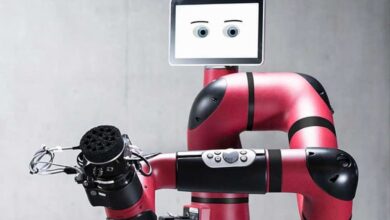China’s Infervision is helping 280 hospitals worldwide detect cancers from images
Until recently, humans have relied on the trained eyes of doctors to diagnose diseases from medical images.
Beijing-based Infervision is among a handful of artificial intelligence startups around the world racing to improve medical imaging analysis through deep learning, the same technology that powers face recognition and autonomous driving.
The startup, which has to date raised $70 million from leading investors like Sequoia Capital China, began by picking out cancerous lung cells, a prevalent cause of death in China. At the Radiological Society of North America’s annual conference in Chicago this week, the three-year-old company announced extending its computer vision prowess to other chest-related conditions like cardiac calcification.
“By adding more scenarios under which our AI works, we are able to offer more help to doctors,” Chen Kuan, founder and chief executive officer of Infervision, told TechCrunch. While a doctor can spot dozens of diseases from one single image scan, AI needs to be taught how to identify multiple target objects in one go.
But Chen says machines already outstrip humans in other aspects. For one, they are much faster readers. It normally takes doctors 15 to 20 minutes to scrutinize one image, whereas Infervision’s AI can process the visuals and put together a report under 30 seconds.
AI also addresses the longstanding issue of misdiagnosis. Chinese clinical newspaper Medical Weekly reported that doctors with less than five years’ experience only got their answers right 44 percent of the time when diagnosing black lung, a disease common among coal miners. And research from Zhejiang University that examined autopsies between 1950 to 2009 found that the total clinical misdiagnosis rate averaged 46 percent.
“Doctors work long hours and are constantly under tremendous stress, which can lead to errors,” suggested Chen.
The founder claimed that his company is able to improve the accuracy rate by 20 percent. AI can also fill in for doctors in remote hinterlands where healthcare provision falls short, which is often the case in China.
Winning the first client

A report on bone fractures produced by Infervision’s medical imaging tool
Like any deep learning company, Infervision needs to keep training its algorithms with data from varied sources. As of this week, the startup is working with 280 hospitals — among which 20 are outside of China — and steadily adding a dozen new partners weekly. It also claims that 70 percent of China’s top-tier hospitals use its lung-specific AI tool.
But the firm has had a rough start.
Chen, a native of Shenzhen in south China, founded Infervision after dropping out of his doctoral program at the University of Chicago where he studied under Nobel-winning economist James Heckman. For the first six months of his entrepreneurial journey, Chen knocked on the doors of 40 hospitals across China — to no avail.
“Medical AI was still a novelty then. Hospitals are by nature conservative because they have to protect patients, which make them reluctant to partner with outsiders,” Chen recalled.
Eventually, Sichuan Provincial People’s Hospital gave Infervision a shot. Chen with his two founding members got hold of a small batch of image data, moved into a tiny apartment next to the hospital, and got the company underway.
“We observed how doctors work, explained to them how AI works, listened to their complaints, and iterated our product,” said Chen. Infervision’s product proved adept, and its name soon gathered steam among more healthcare professionals.
“Hospitals are risk-averse, but as soon as one of them likes us, it goes out to spread the word and other hospitals will soon find us. The medical industry is very tight-knit,” the founder said.
It also helps that AI has evolved from a fringe invention to a norm in healthcare over the past few years, and hospitals start actively seeking help from tech startups.
Infervision has stumbled in its foreign markets as well. In the U.S., for example, Infervision is restricted to visiting doctors only upon appointments, which slows product iteration.
Chen also admitted that many western hospitals did not trust that a Chinese startup could provide state-of-the-art technology. But they welcomed Infervision in as soon as they found out what it’s able to achieve, which is in part thanks to its data treasure — up to 26,000 images a day.
“Regardless of their technological capability, Chinese startups are blessed with access to mountains of data that no startups elsewhere in the world could match. That’s an immediate advantage,” said Chen.
There’s no lack of rivalry in China’s massive medical industry. Yitu, a pivotal player that also applies its AI to surveillance and fintech, unveiled a cancer detection tool at the Chicago radiological conference this week.
Infervision, which generates revenues by charging fees for its AI solution as a service, says that down the road, it will prioritize product development for conditions that incur higher social costs, such as cerebrovascular and cardiovascular diseases.
Source: TechCrunch
To Read Our Daily News Updates, Please visit Inventiva or Subscribe Our Newsletter & Push.




